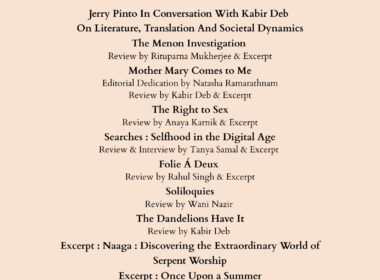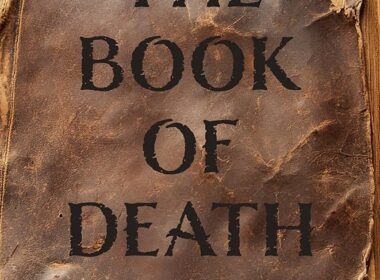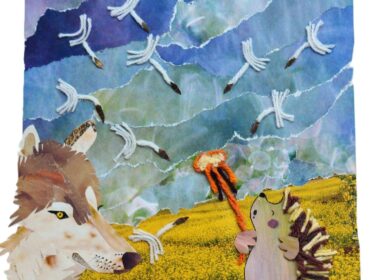Voice and Void: The Liminal Language of Adil Jussawala’s “Soliloquies”
By Wani Nazir

Image Courtesy of HarperCollins Publishers India
Some books shout but others whisper then can change everything. Adil Jussawala’s Soliloquies whispers instead of declaring, breathes but is no monument. It also stays quiet. As a book humming to itself in a corner, it waits until you are calm enough for listening. It feels as if you walk in a room where someone voices prayer, pain, with stubborn hope. Because easy truths or answers are simply not to be found there, it remains a matter with you. It still lingers, seeming to be like a silence. You are not able to dismiss at all the silence.
Jussawala starts now to circle all around his past: “I was either seventeen or eighteen. Jian was my first full-length play.” He remembers all of it softly then fuzzily, either seventeen or eighteen, and that it is fuzzy now feels quite real. Life is a thing just like that, recalled only in some shadows, not in exact dates. For him, sensing emotions seems more of a concern than it is for setting dates. He preferred the feeling of being unsure, open, and he also buzzed with energy.
That unsureness of his pops up at times when he says, “I don’t think you can dismiss mysticism as obfuscation.” If you tend to rush, it is easy for you to miss. Such vagueness counts in the text. Anything mystical can get brushed off as quite silly or vague in these times. It reaches up for that which is beyond our sight or our speech. Jussawala says no. Mysticism, to him, is not fleeing sense; it is another way to discuss —making sense of what eludes definition. Now Simone Weil is saying attention is the best prayer, plus the Upanishads’ quiet, or Eliot finding peace makes one think. Jussawala seems to fit right in among all of those who understand how indirection is key to even the biggest things.
Critchley now says something quite interesting concerning either Julian of Norwich or Meister Eckhart: the Word actually was silent. “From the Bible, what I have from memory is: In the beginning was the Word, and the Word was with God. What Critchley does, in explaining either Julian of Norwich or Meister Eckhart, he says something very interesting, that the Word was silent.” The “silent Word” is quite beautiful yet strange, so language now starts with something lacking, even though the Word existed at the start though silent. Here poetry is tricky: we try to make noise from quietness, shape what is shapeless, but we must remember quietness first. Jussawala apparently lives somewhere. That place is difficult. His poems, wanting not to be too clear, talk, look away, hesitate, and stop.
He is confused even when discussing community: “I don’t know if there was a feeling of community, at least that’s not what I got. Nissim’s office at PEN was a meeting ground for informal readings.” Belonging never truly happens when isolation appears. However, he does not feel as part of it, but people gather since this confusion in his reflections is obvious and “at least that’s not what I got” says so much for Nissim’s PEN office being a meeting ground for informal readings. Though an office was present, no real home existed ever. His poems reveal feeling his voice feels distant from God and people.
He talks of the missing person as if like a puzzle: “Does he want to be found, or does he want to be invisible, or on the margin? I think the tearing apart of the protagonist in the poem isn’t entirely autobiographical.” Isn’t that just as the question with poems? The person that is within the poem is Torn plus that poet is also Torn plus the reader is Torn. Poetry is where you may be noticed, you may disappear, and all that can occur now. I feel like Pessoa’s writers, Dickinson’s letters, Celan writing into nothing. Someone gone stays in the present. The speaker is always to be located at their front.
Disagreements along with tension and distance yet also sticking it out with love is there: He is honest, as this is clear, “Our friendship (Nissim’s and Jussawala’s) remained intact till the very end despite it being strained from time to time. Our different politics got in the way.” These rough patches even his friendship with Nissim Ezekiel had. It is rather chaotic, like Soliloquies. The book avoids simulating perfection. It does not attempt to do with so.
The poems come next. These are poems themselves. Where should a person have to even begin from? One must start somewhere. They hit you hard. Bam! then the book opens.
“My Father?
This bastard father intrudes as always
Nothing’s been gained but
Pain and fear and illusion,
Dissolution, darkness, despair—
These things affect me still—growing
Around me stronger than before—
And strangling.”
Focus with intent on that which is of most importance. No fancy words. A grown up kid still choking in the past, just pain, anger. Pain and also fear and illusion and dissolution and darkness and then despair and also “this bastard father”, which truly is harsh, is the thing that gets to you, as Augustine’s inside-out confessions do, Kavanagh’s grumbling does, and Plath’s poem Daddy does. Nearly of concrete are as the choking words.
Then in an instant it mainly then turns.
“Knowledge which began a vast
Cycle at my birth is closing
On itself now.”
Because knowledge itself goes around in circles, you are in a trap. That your life is now stuck within the patterns, and set just before you is now the feeling. Eliot does once again come to one’s mind: He just did say that “ In my beginning is my end.”
But the circumstances are different. At that point, a little spark of hope appears.
“Sun will rise again.
Fires will Warm, but till then why must I be
Left unsatisfied,
Asking and doubting the nature of
What I am, and what around
Me must be?”
Now the unsure hope feels no big deal. The sun will rise up indeed, yet this speaker is sad chewing her uncertainty. That combining backs the poem’s reality. The mix involves that of rising yet of not being satisfied and of hope and doubt.
Such lines exist. Prayers are also lines. These lines do now ache, almost as if begging now.
“Heal this pain of division, Lord,
This parting of ways.
Cannot those I love receive You
Through me, that I must
Leave them to illusion, and know
Truth myself?”
Love has a power to unite even God with all people beyond just salvation so that voice has desires for connection for each one. That hope stings harder because facing truth means dreading abandonment by dear kin.
“There is one, calling far from
Home and hope, in a lonely
Land—eating spit, drinking
Tears where no one calls a name”
Tears existed since then, and no names were called. Tears could be seen to be present, but names stayed still unsaid. No one spoke then a name.
“Or asks me where I go,
Where even the earth and all”
That image hits hard in a nameless place: eating spit, drinking tears, without name. The wandering poet, Job, the refugee, coupled with also the modern exile of the Psalms come to mind.
That remains a shaky faith moment.
“If then I love you still, God,
Myself shall be absolved, as all
My conscious will shall be, and your Presence shall stay with me forever.”
It is not easy faith. It is perhaps because a “still” goes with it as if it is like a question that its quality is touching.
Poems focus on peace, on new observations, on eternal childhood.
“There is within us all though not a dream
A peace which despite unprevailing
Laws prevails for you you
and you that
you may have fulfilment”
and
“Ever be a child awakening
as one that forever opens
its eyes and awakes
Imagine its eternal moment
of revelation”
However they also give up since they circle in despair. Again just a circle tries then. It tries at closing.
“But at this gap between
Beginning and end I stopped,
Turned away from
Love In defiance
And dropped.”
and finally:
“I renounce this home,
This family and the shelter
It has given me from the
Chaos outside it.”
That hooks me, and there the book misses one mood. It varies among anger, worship, despair and hope. It circles back. It argues with itself. The phrase stops itself abruptly now. A plight does involve being quite human.
Duino Elegies by Rilke keep coming to mind; angels vanish then appear. The speaker then shifts in a rapid way from terror and to awe. Bright as strange, Blake’s visions. Confessing during still Plath’s, or chanting sharp lines. Soliloquies bear a resemblance to such things despite its uniqueness.
It is unsettling that Jussawala makes an allowance for visible cracks. Even though all of the words are not always so perfect and even the sentences do stumble, still that is what makes the book. Instead, weakness isn’t the truth. Despair’s perfect words in conversation can be untrue. Stumbling then is actually and in fact the main point.
Thus the book lacks a tidy ending. It pauses, then questions do arise, and then it circles around. It is persistence that could be an explanation. Since life is just like that, even the poems know about it. What cannot be closed is about what they try to close.
Ultimately Soliloquies offer to us no happy ending or no rulebook. It leaves us with an echo from a voice that persists. Jussawala shows poetry sings in cracks instead of fixing them, finds light in quiet, in starting over, in giving up, in falling, in stopping, in circling around, where at the “gap between Beginning and end” something beats; bright, beat-up poems remind us the soul is always waking because eyes open to something new, over and over, like forever is just opening up your eyes.
Poet and critic Adil Jussawalla was born in Mumbai and educated at Cathedral and John Connon School. He spent the years between 1957 and 1970 in England, where he studied architecture at the Architectural Association School in London, earned a master’s in English at Oxford, and taught at a language school. Thereafter, he returned to Mumbai, becoming a lecturer in English literature at St. Xavier’s College. Later, he served as the book review editor of The Indian Express, literary editor of The Express Magazine and editor of Debonair magazine. He also co-founded Clearing House, a poets’ publishing co-operative.
He has written three books of poetry, Land’s End (1962), Missing Person (1972) and Trying to Say Goodbye (2014), for which he received the Sahitya Akademi Award; and edited a landmark anthology, New Writing in India (1974). His other works include The Right Kind of Dog (2013); Maps for a Mortal Moon (2014) and I Dreamt a Horse Fell from the Sky (2015).1

Image Courtesy of Jehangir Nicholson Art Foundation
Reviewer
A Kashmir University Postgraduate Gold medalist in English Literature, Wani Nazir, from Pulwama J&K India, is an alumnus of the University of Kashmir, Srinagar. He is the author of a poetic collection, “…and the silence whispered” and “The Chill in the Bones”.
Presently working as a Senior Lecturer in the Department of Education, J&K, he has been writing both prose and poetry in English, Urdu and in his mother tongue Kashmiri. He is a voracious and wild reader and a reviewer. He contributes his brain-children-his poetry and prose in Kashur Qalam, The Significant League, Muse India e-Journal, Setu-a bilingual e-journal published from Pittsburgh, USA, Langlit & Literary Herald – both UGC approved journal, the Caffe Dissensus and Learning and Creativity – a Silhouette Magazine, the Dialogue Times – a journal published from London, and has been receiving laurels for his beautiful writings.




